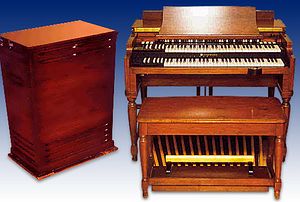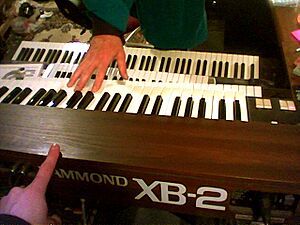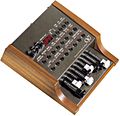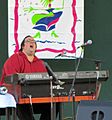Clonewheel organ facts for kids
A clonewheel organ is a special type of electronic musical instrument. It's designed to sound exactly like the old, classic Hammond organs. These original Hammond organs used spinning metal wheels to make their sound. Clonewheel organs "clone" or copy that unique sound using modern electronics.
The first clonewheel organs weren't very good at sounding like a real Hammond. But by the 1990s and 2000s, new technology made them much better. They started using techniques like "sampling" (recording real sounds) or "digital signal processing" (using computer chips to create sounds). This helped them capture all the special details of the old Hammond sound.
Contents
The Story of Clonewheel Organs
What is a Hammond Organ?

The Hammond organ is a famous musical instrument. It was invented by Laurens Hammond in 1934. It's called an "electromechanical" organ because it uses both electricity and moving parts.
At first, Hammond organs were sold to churches. They were a cheaper choice than big pipe organs. But soon, musicians discovered their cool sound. They became very popular in jazz and blues music. Later, in the 1960s and 1970s, they were a big part of rock music and gospel music.
Why Were "Clones" Needed?
Old Hammond organs are amazing, but they have a few problems for musicians. They are incredibly heavy and hard to move around. For example, a Hammond B-3 organ with its bench and pedalboard weighs about 425 pounds (193 kg)! That's like moving two big refrigerators!
Musicians also use special Leslie speaker cabinets with their Hammonds. These speakers are also very heavy. Moving all this gear to concerts is a huge job.
Also, because they are old, these instruments can break down. The spinning tonewheels or electric motor might have problems. It can be hard to fix them quickly, especially when a band is on tour.
Because of these challenges, musicians really wanted a way to get the Hammond sound. They needed something much lighter and more reliable. This led to the creation of clonewheel organs. These new electronic organs could make the same great sound without all the heavy lifting and worry.
Images for kids












